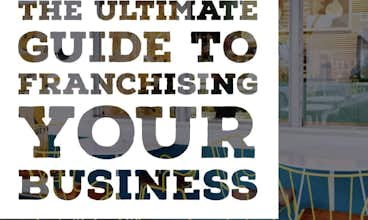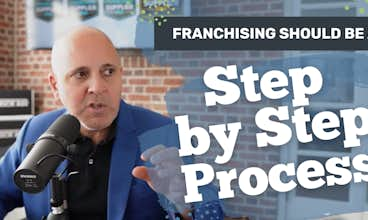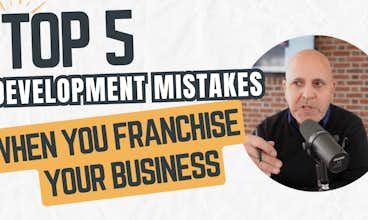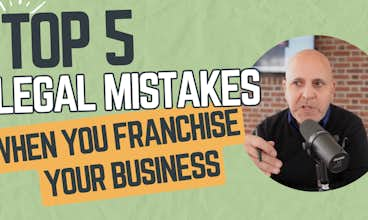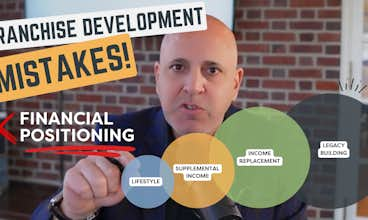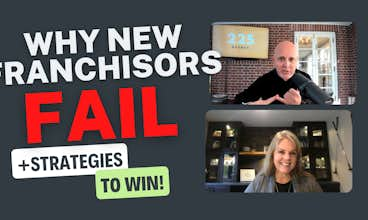Is it the right time to franchise?
As a proven business model that’s designed for scaling, franchising can be an exciting next step for founders whose brands are positioned for growth.
Despite its seemingly limitless potential, though, franchising isn’t necessarily right for every business. In addition to making sure your brand is financially sound with the right foundation for scaling, choosing the right time to franchise your business is also critical for avoiding mistakes that could undermine your success. But as an aspiring franchisor, how can you tell whether now is the right time to franchise – or if it would be smarter to focus on improving your business before taking the leap?
3 Reasons Why You Might Not Be Ready to Franchise Your Business are:
- Your unit economics aren't strong enough
- You don't have a franchisor mindset
- Your business model isn't scalable
In this article, we’ll explore these three reasons you might not be ready to franchise your business – and why it could be better to wait until you’re properly positioned to become a franchisor.
1. Your unit economics aren’t strong enough
Whether you own a retail business, a service-based business, or a restaurant, your success as a franchisor depends on your track record of financial success. This includes having a history of strong unit-level economics, gross sales, profitability and the ability to onboard and support your pioneering franchisees during their first several years in business. It should also mean that your numbers can stand up to those of your competitors – a critical factor for selling franchises.
If your unit economics aren’t competitive enough to franchise yet, there are steps you can take to improve your situation. To prepare for franchising in the future, consider doing the following:
Evaluate your unit economics. Take a look at your KPIs, gross sales, gross profits, cost of goods sold, rent, labor costs, etc. and determine pain points that need improvement.
Revamp your business model for profitability. Once you’ve identified the key areas where your business needs improvement, make the appropriate changes with an emphasis on increasing your brand’s profitability.
Rethink your costs. Make sure the way your business spends money is worth it – and, ideally, gives your franchisees an advantage. Evaluate the cost of goods and labor, and make changes where necessary to boost your unit-level economics.
By evaluating your company’s financial performance and rewriting your economic story, you can change the trajectory of your business and get it on track to franchise successfully.
2. You don’t have a franchisor mindset
To achieve long-term success as a franchisor, having the right mindset is everything. Whether you’re thinking about franchising or you’ve already franchised your business through a franchise development company, it’s important to recognize that franchising is serious business and a lot of hard work. It shouldn’t ever be taken lightly or treated as an afterthought.
To get your head in the right place as an aspiring or emerging franchisor – and to keep your vision of success grounded in reality – consider doing the following:
Develop a five-year vision. Franchising success doesn’t happen overnight. To keep things real, create a five-year success plan. Expect to spend your first couple of years organically seasoning your brand. During years two and three, plan to improve and refine your brand. Finally, expect to achieve growth and acceleration in years four and five.
Create compelling marketing materials. When it comes to selling franchises, building a compelling franchise brand story and sales website is critical. By taking the time to tell your brand’s story, you can differentiate it from the competition and appeal to prospective franchisees and brokers.
Keep evolving. Remember to keep growing alongside your business. When you finally franchise your brand in the future, this will ensure that your offering is mature, up-to-date and ready to tackle any challenges that might come its way.
By adopting a growth mindset and ensuring that your brand exudes a polished, professional demeanor and has a great story behind it, your business will be on the track for franchising success in no time.
3. Your business model isn’t scalable
Having a scalable business model is necessary for franchising your business. Without a model that can be scaled at the franchisee level, achieving success as a franchisor is highly unlikely – if not impossible.
To determine whether your business is scalable, ask the following questions:
What does your supply chain look like?
For retail businesses, will franchisees be supplied inventory at wholesale prices that leave profit margins intact?
For restaurants, can your production be easily replicated by franchisees with consistent levels of quality?
For service-based businesses, will franchisees have access to technology and resources that allow them to replicate your services across all locations?
If your business model isn’t scalable right now, that’s okay. Take some time to evaluate your systems and processes with a focus on improving and rebuilding them to scale at the franchisee level.
By taking a step back today, you can position your small business for franchising in the future while setting your brand apart from the competition even before it launches.
